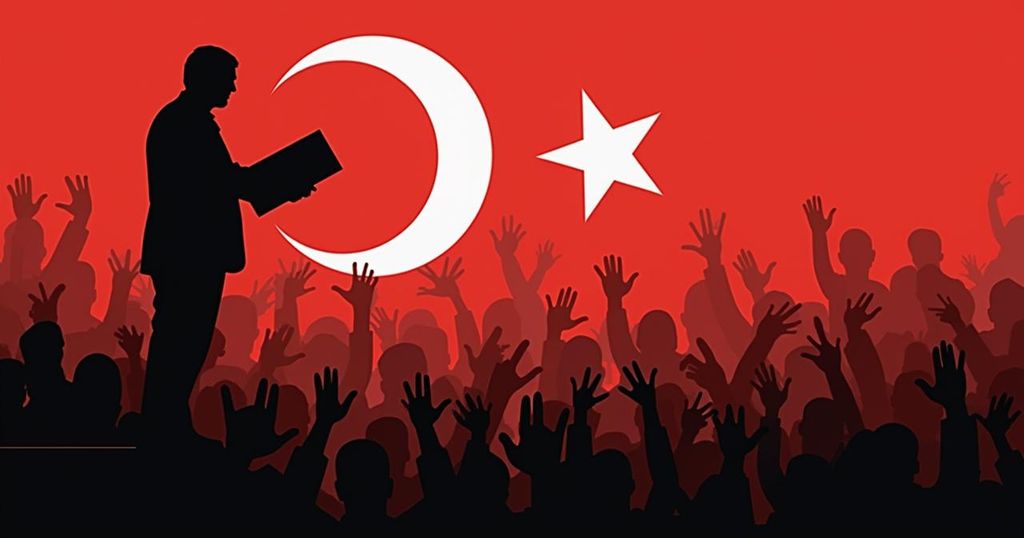Tunisia Votes in Presidential Election Amid Repression and Disillusionment
Tunisia’s presidential election showcases incumbent Kais Saied’s probable victory with minimal opposition amid widespread political repression. With the election commission disallowing numerous candidates and key critics imprisoned, the electoral atmosphere is marked by public disillusionment and economic despair. Saied’s past power grab has curtailed democratic processes, leading to apprehensions about Tunisia’s future political landscape.
On Sunday, Tunisia held a presidential election characterized by an overwhelming lack of opposition to the incumbent, Kais Saied, who is anticipated to secure another term in office. The election featured only two candidates: a former lawmaker who had previously backed Saied’s controversial power acquisition in 2021, and a businessman currently incarcerated. The Tunisian election commission disallowed 14 potential candidates from participating, citing various reasons, generating significant public outcry during a period marked by increased repression and a crackdown on dissent. This election is perceived as a pivotal moment, effectively concluding Tunisia’s tumultuous experiment with democracy that began with the Arab Spring uprisings. With polling stations opening at 8:00 a.m. local time and closing at 6:00 p.m., preliminary results are expected to be released by Wednesday. The electoral atmosphere has been distinctly muted, lacking campaign rallies or public discussions, and campaign materials overwhelmingly feature Saied. The prevailing sentiment among many voters is one of indifference, with many expressing skepticism about the electoral process and its potential for enacting change. For instance, a young voter named Mohamed articulated feelings of disillusionment, stating, “We have nothing to do with politics… it is pointless to vote.” Since gaining power in 2019, Saied has significantly altered Tunisia’s political landscape, notably by amending the constitution to reinforce his authority. These actions have sparked criticism domestically and internationally, particularly as numerous individuals, including prominent political opponents, have been jailed under increasingly authoritarian measures. Organizations such as Human Rights Watch have reported that over 170 individuals are detained for political reasons or for exercising their fundamental rights. The election is juxtaposed with an economic crisis that has stifled enthusiasm for voter participation, despite the electoral board’s projection of approximately 9.7 million expected voters. The International Crisis Group noted a recent report suggesting that the economic difficulties endured by the populace have diminished any fervor for the elections, explaining that many citizens associate a continued mandate for Saied with further socio-economic decline. Opposing Saied are the former lawmaker Zouhair Maghzaoui, who supported Saied’s prior power consolidation, and Ayachi Zammel, a less-known businessman, currently imprisoned on allegations of fraud related to his candidacy. In his remarks before the election, Saied urged voters to participate massively in what he referred to as a phase of “reconstruction,” while simultaneously accusing external conspiratorial forces of undermining his government. Nonetheless, critics assert that Saied’s presidency has failed to adequately address Tunisia’s pervasive economic challenges. In conclusion, the Tunisian presidential election reflects deep-seated political repression and a lack of viable alternatives for the electorate. With significant opposition figures imprisoned and the public’s disillusionment prevalent, the anticipated victory for Kais Saied is indicative of Tunisia’s ongoing struggle towards genuine democratic practices amid escalating authoritarianism.
Tunisia’s presidential election occurs in the shadow of significant political repression and a lack of viable opposition. Following a power grab by incumbent Kais Saied in 2021, the political landscape has been reshaped, allowing Saied to dominate the electoral process. The restrictive measures imposed by the electoral commission, such as barring numerous candidates and the jailing of key political figures, suggest a closing chapter on the democratization effort initiated by the Arab Spring. This election serves as a litmus test for the future of political freedom and democratic governance in Tunisia amidst ongoing socio-economic challenges.
The Tunisian presidential election signifies a pivotal event demonstrating the stark realities of political oppression and limited electoral choices faced by the population. The anticipated continuation of Saied’s tenure raises concerns over the further erosion of democratic practices and worsening economic conditions, thereby reflecting the complexities of Tunisia’s journey post-Arab Spring.
Original Source: www.france24.com




Post Comment